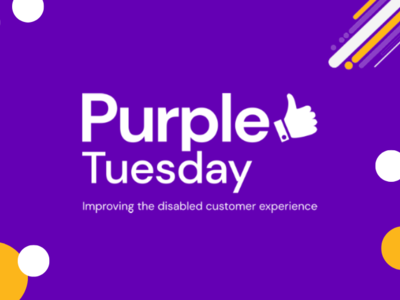Why Accessible Recruitment Matters
Accessibility is essential to creating a truly inclusive recruitment process, where all candidates, regardless of their abilities, feel supported and empowered. In honour of Purple Tuesday - a day dedicated to improving accessibility for people with disabilities—we’re sharing practical ways to make the candidate experience more accessible and inclusive.
Creating an accessible recruitment process is no longer just a "nice to have"; it’s a crucial component of any business that values inclusivity. By creating a welcoming environment for candidates with disabilities, companies can attract a wider range of talent, reduce hiring barriers, and enhance their commitment to diversity and inclusion. Here’s how to improve accessibility in recruitment:
1. Write Clear, Inclusive Job Descriptions
The candidate experience begins with the job description. Use clear, concise language and avoid jargon, which can confuse or exclude some candidates. Focus on only the skills that are truly necessary for the role, and leave out any unnecessary job requirements that may exclude otherwise qualified applicants.
Clearly state that reasonable adjustments are available. For example, use language like, “We’re committed to providing reasonable adjustments throughout the application process and beyond.” This shows candidates that you value inclusivity from the start.
2. Ensure the Application Process Is Accessible
An accessible application process is vital. Check that your online portal is compatible with screen readers and other assistive technology. Offer features like font size adjustment, contrast options, and clear navigation to make the portal easy for all candidates to use.
Consider alternative methods for applicants who may find online portals challenging - such as accepting applications by email or offering phone interviews. These options help ensure all candidates feel included and supported.
3. Review and Improve Your Interview Process for Accessibility
When was the last time you reviewed your interview process for accessibility? Ensuring your interview process is inclusive is a critical step toward creating an accessible candidate experience.
Every candidate is unique, and different interview formats - whether virtual, in-person, or over the phone - present varying challenges and opportunities. Consider offering flexible interview options so candidates can choose the format that best suits their needs. For instance, virtual interviews may work well for those with mobility issues, while some neurodiverse candidates may prefer in-person settings that allow for clearer visual cues.
Check out our recent blog for 10 Tips To Make Virtual Interviews Digitally Accessible.
4. Train Your Interviewers on Inclusive Hiring Practices
Inclusivity starts with your interview team. Providing interviewer training on inclusive hiring practices and unconscious bias will help ensure your interviewers understand the importance of reasonable adjustments and accessibility in the hiring process.
With training, interviewers can create an environment where candidates feel respected and valued, leading to a more positive candidate experience.
5. Provide Transparent and Accessible Communication Channels
Clear communication is a cornerstone of an accessible recruitment process. Give candidates a direct point of contact for any accessibility-related questions. Include contact details in your job adverts and application portals so that candidates feel comfortable reaching out to discuss any needs.
Transparency is crucial - letting candidates know that your company is committed to supporting them throughout the recruitment process builds trust and fosters a positive candidate experience.
6. Showcase Your Commitment to Accessibility and Inclusion
Your company’s dedication to accessibility and inclusion should be visible. Include information about your accessibility initiatives on your careers page, and highlight any partnerships with disability organisations. Showcasing workplace features like wheelchair-accessible facilities or inclusive training programmes demonstrates your commitment to a truly inclusive culture.
7. Request Feedback from Disabled Candidates to Improve Your Process
After the recruitment process, consider asking disabled candidates for feedback on their experience. This helps you gain insights into what worked and what didn’t, providing valuable information for ongoing improvements in accessible recruitment practices.
Conclusion: Embracing Accessibility to Improve the Candidate Experience
Implementing these accessible recruitment practices enables companies to create an inclusive candidate experience where all applicants feel valued. Improving accessibility broadens the talent pool and strengthens a company’s culture by embracing a diverse workforce.
When we make recruitment accessible, we open doors for people with diverse skills and perspectives - benefiting teams, businesses, and communities. Embrace accessibility and help build a candidate experience that welcomes everyone.



